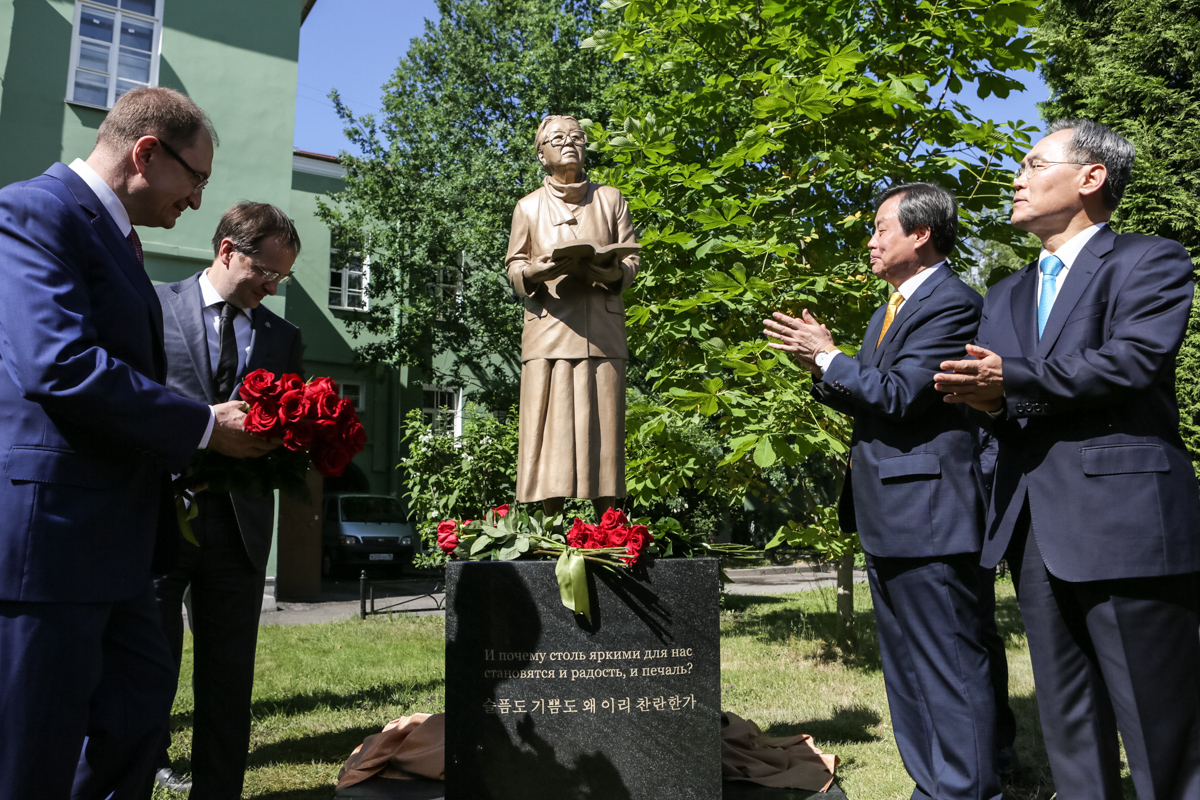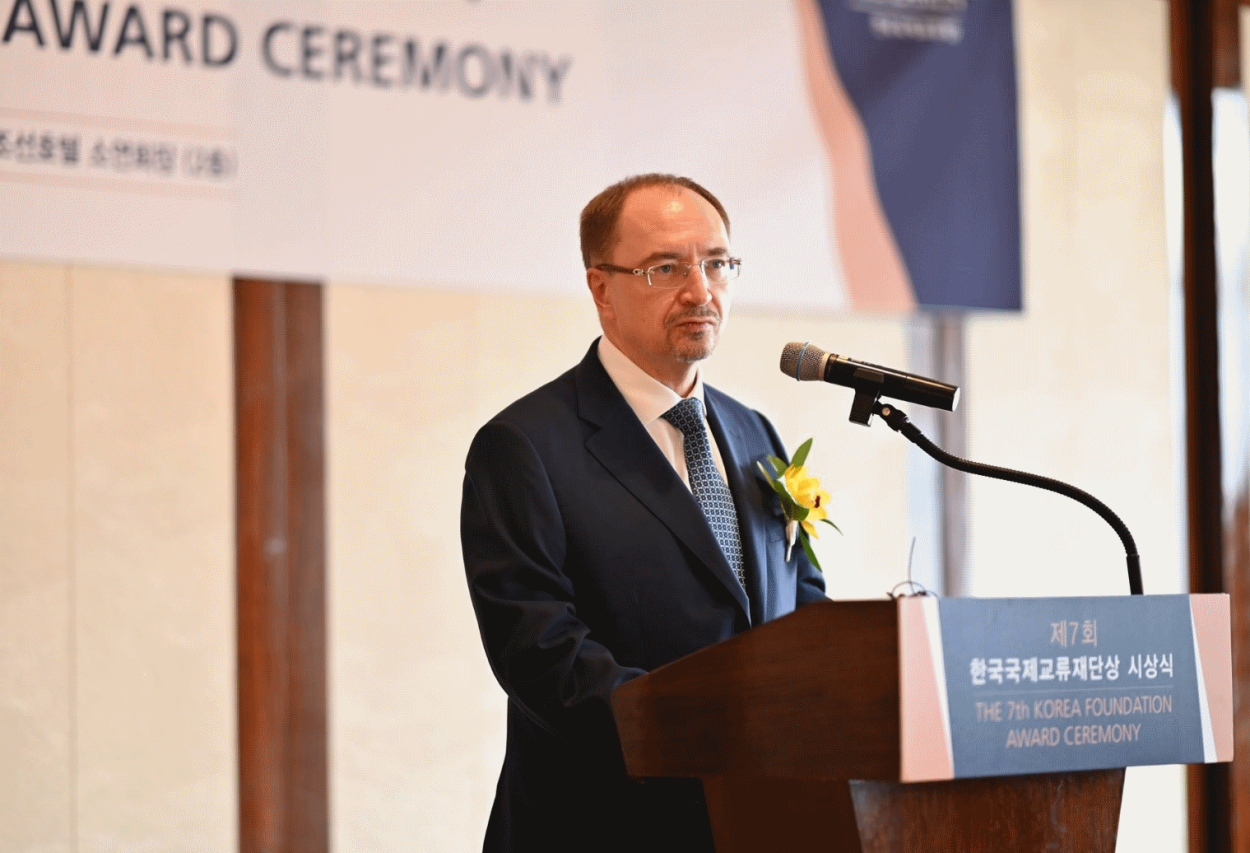Interview of Nikolay Kropachev, Rector of St Petersburg University, upon receiving the Korea Foundation Award
The KF established the Korea Foundation Award in 2008 to honor individuals or organizations in Korea and abroad who strive to promote mutual understanding and friendship between the people of Korea and the global community. In 2019, the seventh Korea Foundation Award was conferred on Dr. Nikolay Kropachev, Rector of Saint Petersburg State University (SPbU) in Russia. SPbU is known to have first introduced Korean language education to Europe about 120 years ago; during his tenure in his current position, which he has held over the past 10 years, Dr. Kropachev has contributed tremendously to further promoting Korean studies and Korea-Russia relations. Dr. Kropachev expressed strong interest in and warm affection for Korea in his speech as the award winner, and seemed to have even more to say. The KF invited him to share his thoughts in our newsletter.
Q. Congratulations on winning the seventh Korea Foundation Award. How do you feel about this occasion?
First of all, I want to say thank you to those who have given me the honor of receiving the Korea Foundation Award. I have strived for the development of the Korea-Russia relationship for the past 10 years and I am glad that my efforts have been recognized so highly. I have done many things to expand bilateral exchange but I did them for my own pleasure, satisfaction, and happiness, and I wonder if I deserve such a great honor. I would like to extend my gratitude to all the Korean and Russian students, researchers, professors, and university presidents who have shared their views and goals and worked together with me. I will happily work harder in the coming days to bring our two countries closer.
Q. Over the past 10 years, you have devoted yourself to expanding Korea-Russia exchange in various fields including diplomacy, education, art and culture, and journalism. Could you elaborate on your activities and achievements?
It is not easy to enumerate my past memories because I carried out so many big and small things together with many people over a decade. I hope you will understand if I ramble a bit. Most of all, I feel proud as I note the increase of people-to-people contacts. The number of Koreans studying in Russia increased more than five-fold during the past 10 years, and the number of Russian students in Korea leaped too. Human resources exchange expanded in almost all fields involving joint research, writings and publication, academic exchange, and exchange students. 10 years ago, SPbU had four or five Korea-related courses but now it has dozens of them. We have Korean music and dance ensemble teams and we’ve translated and published Pak Kyongni’s novel Toji (Land) into Russian and set up a statue of the author on our campus. We have also held Korean culture festivals. Believe it or not, I did all of these things only because I love Korea so much and because I feel happy to see the expansion of bilateral exchange.
Q. You surely have done a tremendous amount of work. Of all your achievements, could you point out a couple of things that you personally think are most significant?
When you travel abroad, where do you usually go? Some people visit museums, galleries, or memorials. Others go to historic places, sites rich in the country’s tradition, or those that offer a glimpse into the religious culture of the country. I myself tend to visit places where I can feel the spirit of great figures. Why do I say this? Because I feel very proud of having erected the statue of the renowned Korean writer Pak Kyongni in Saint Petersburg, Russia, and of having unveiled the statue of renowned Russian writer [Alexander] Pushkin in Seoul, Korea. I feel proud that I have made a place for Koreans to go when they visit Saint Petersburg and a place for Russians to go when they visit Seoul.
Another meaningful achievement is prompting the visa exemption agreement that enables peoples of our two countries to visit each other more easily. At the time of the Korea-Russia Dialogue Forum in 2013, the Korean coordination committee chairperson and I jointly recommended the agreement to the presidents of our two countries. There were concerns and skepticism that we were moving too fast, but we thought such an agreement would play a great role in expanding and developing bilateral exchange. Surprisingly enough, the agreement was signed just one year later. Our sincere belief that such an agreement was essential for the development of bilateral relations seemed to have reached the authorities concerned, producing such a wonderful result in such a short span of time. As I look back, I still feel extremely proud and thankful.
Q. You became an honorary citizen of Seoul in 2018 and won the Korea Foundation Award in 2019. What special recognition or relationship would you like to have in the year 2020? Do you have any specific plans or goals?
I have many plans for the year 2020. First, I plan to expand exchange in the field of educational administration to the effect of mutually recognizing the academic degrees of Korean and Russian students. Lots of procedural matters should be settled before the mutual recognition of degrees is realized, but it is a prerequisite for the expansion and promotion of bilateral exchange in many more fields.
I also wish to see exchange in the area of contemporary literature. If you look at the novels and other literary works published in both countries, you will find the rate of classical works is remarkably high. It is quite rare to see the translation and publication of the latest literary works depicting contemporary society and I think that’s a shame. In the new year, I would like to step up efforts to translate great works from the two countries that have been written in recent times. I plan to publish an anthology of some 20 short stories. By reading a single book, readers will be able to glimpse the literary worlds of 15 to 20 Korean and Russian writers. I also plan to support the release and screening of movies based on literary works in the two countries.
Q. Besides linguistic and cultural exchange, what kinds of efforts could further enhance the relationship between Korea and Russia?
I think improvement of relations with North Korea is very important for the expansion and promotion of South Korea-Russia exchange. I believe Russia has something to contribute to inter-Korean exchange. There may be limits to the role of academic circles, but we may be able to narrow the gap between different views on political and diplomatic problems by increasing cultural exchange and people-to- people contact. Cultural exchange can at least ease a hostile atmosphere and tensions.
I think it is possible to hold tripartite academic gatherings involving the two Koreas and Russia, or summer or winter camps, or some campaign-type sports events like a bicycle rally or a marathon that runs through the two Koreas and Russia. If these activities are repeated, the people of South and North Korea may become friends.
Korea-Russia exchange will further expand and this will be beneficial not only for the development of bilateral relations but also as meaningful interaction for peace on the Korean Peninsula and the improvement of inter-Korean relations. As Korea and Russia celebrate the 30th anniversary of their diplomatic relationship, I expect to see continuous growth of mutual visits and friendship between the two countries, and I have no doubt that the KF will play a greater role in the promotion of Korea-Russia ties.



